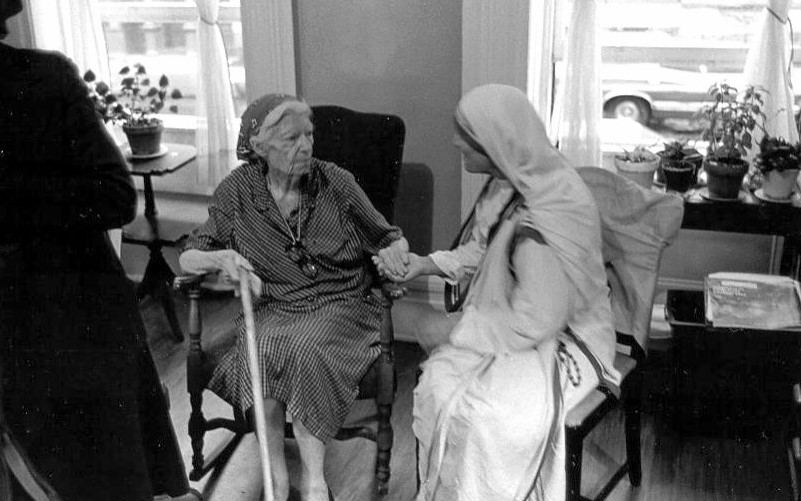Lessons in loneliness at Christmas from Dorothy Day
December 22, 2021
Following Dorothy Day’s example, facing our emptiness is the first step to asking and receiving the healing grace of Christmas.
What I or you or anyone makes of Christmas this one, last one, any one is always a combination of two things: the content of the different narratives that we find in the three Gospel accounts (Matthew, Mark and Luke) of the birth of Jesus and how that content intersects with our own recent or longer term biographies. The meaning doesnt develop until we situate the stories for their relevance to our own lifes journey.
And if they have none, then the Christmas narrative will be completely lost on us. Finding the fit can be demanding.
Right now, whats most affecting me are the deaths of several friends in different circumstances and with different impacts. But death does help to focus my attention and these have had an immensely significant impact on me.
What has added to this experience is the impact of the amputation of my left leg at the knee. That particularly arresting enfeeblement has intensified my focus on physical helplessness and decline. Its neither pretty nor comforting: losing mobility is not only a restriction of freedom but a reminder of the crippling and at times humiliating dependence that is my lot now until the end of physical life.
What is helping me think and pray this Christmas is some reading Im doing of and about Dorothy Day, The mostly New York-based social activist, sometime communist and convert to Catholicism, Dorothy Day.
Since the first time I read about her or learnt anything about her life, Dorothy Day has been an iconic figure for me. And like all icons, she has been objective, distant and just a bit intimidating.
I recalled all this when reading a thoughtful tribute to her on the anniversary of her death (November 29, 1980) in a publication she wrote for, Commonweal. It was reproduced by the editors of a publication I am the publisher of La Croix International to commemorate her death in November 1980 in an article by James Lang.
Dorothy Day was also quite exotic for me as one coming from a snap frozen Irish Catholic subculture in the fiercely anti-communist Australia of the 1950s and then the Vietnam War-dominated 1960s. And having a communist and never married single mother come across the divide between us and the communists was something of endless fascination to a moral simpleton like me, trapped in the emotionally crippling constraints of that period of Catholic life in Australia which it had in common with many parts of the post-World War II culture available across the West.
I had lots of company and I wasnt alone in being shackled by those constraints. But choosing to enter our culture made Dorothy Day a rare and unusual recruit. And she took me and many others in unexpected directions. By vocation, she was a writer with a decidedly prayerful, even mystical edge to her investigations and expositions.
And in that, she modelled a style and approach to Catholic faith that anticipated what would be asked of Catholic believers in the decades ahead: an intense interior life of prayer and contemplation and a searching intelligence as the ideological hiding places Catholics had fashioned for themselves in those decades to hide from the challenges of the real world just evaporated as the intense heat of serious examination meant the old cliches just didnt stand up to scrutiny.
That sounds like an invitation to receive and embrace the offer of liberation for Dorothy and all those like me who saw her journey as one leading to liberation. But was it? Well, not really. I found myself in a dark and unwelcoming corner that, rather than embracing me, I really just wanted to flee. Why? Because it confronted me with some unpleasant and unwelcome facts.
The experience is captured in the title of her autobiography, The Long Loneliness. That experience is there for anyone seeing through the search to every reach of experience on their own. And the shape of that experience is anticipated in the life of the Jesus whose birth we celebrate at Christmas from a birth in an unremarkable stable because there was no room at the inn to abandonment on Golgotha where the only company interested in him was another executed criminal and an incredulous executioner.
To make anything of this experience asks an awful lot of us and the first thing it asks is for us to simply stop and listen to ourselves, the stirrings in our own hearts, the longings for joy and peace that seem so distant, the incompleteness that leaves us restless for peace and joy. Really having the courage and confidence to face our emptiness is the necessary first step to asking and receiving the healing grace of Christmas.
Christmas Day and Good Friday for that matter are known among police and emergency services as days of high alert. Why? I suspect its because on those days we come face to face with who we are, who is actually in our inner circle, how empty our lives are and can be and really how exposed each of us is every day when all the distractions are trimmed away.
I am temperamentally an extrovert and I need and rejoice in engagement with others to get my juices going. I can feel it coming when that engagement starts to lag. Rather than turn to antidepressants, I clear the decks for contemplation which is the active surrender of all I am memory, understanding and will into the hands of God that Jesus may be born in my conflicted and uncertain heart.

